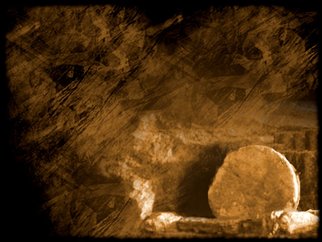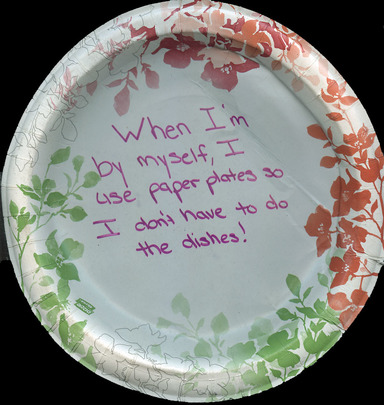 Luke 23:50-24:11 ...Have you ever wondered what it would have been like to live in the year 30 and walk and talk with Jesus around Galilee? To break bread in Nazareth and hear Jesus’ parables and gather in the Upper Room for Passover in Jerusalem? Most of us would jump at the chance, right?! We’re doing our best to journey with Jesus today, but wouldn’t it be better, wouldn’t it be more satisfying, wouldn’t it be easier, to journey with Jesus if we were fishing with him like James and John? If we were sitting at his feet like Mary? If we had him over for lunch like Zacchaeus? It must have been so much easier to follow Jesus in the flesh, the first time around, going about Galilee as a group like the 12. Better! More satisfying! Easier! Maybe. Maybe easier. But not easy. What do we know about the disciples, about Jesus’ friends and followers? Tax collectors, zealots, fishing folk. Struggling, striving, ordinary people – people making mistakes, people trying again, people seeking abundant life. They walked and talked and ate with Jesus. They traveled healing, preaching, feeding, with Jesus. They learned. They grew. And still. They kept making mistakes. We heard about a few of them through our dramas this morning. Simon, struggling with anger, Andrew, struggling with mediocrity, Matthew, struggling with doubt, and Peter! Peter is the rock upon Jesus says he will build his church, Peter gets out of the boat to walk on water and he sinks like a rock! Peter denies Jesus three times! And what about Judas?! Judas walked with Jesus and they shared the first communion, the first feetwashing. Judas was a disciple. Journeying with Jesus in year 30 – well, maybe it was easier, maybe it wasn’t, but we know it wasn’t easy. “Where two or three are gathered in my name, there I am among them,” says Jesus. And that is just one of the ways he lives, just one of the ways Jesus lives, just one way that he is resurrected. When we gather in Jesus’ name he lives. Jesus doesn’t say, “where two or three gather in perfection in my name, there I am among them.” Jesus doesn’t say, “where two or three gather and have it all figured out, then I show up.” Pastor Nadia Bolz-Weber says “Where two or three screw-ups are gathered” Jesus is among us. Praise God. In the upper room, Jesus broke bread and knelt in service, and poured himself out in love, for Peter, who would deny him. For Thomas, who would doubt him. For Judas, who would betray him. Where two or three screw-ups gather, in year 30, in 2016, Jesus lives among us. And we live, too. We come to life, we resurrect, with Jesus. You’ve heard it said, “Save your life, you’ll lose it. Lose your life, you’ll find it.” You’ve heard it said, “Those who love their lives in this world will lose them.” We come to life when we stop trying to save ourselves, when we stop trying to perfect ourselves, when we stop trying to control our righteousness. We come to life when we let go and let God work in our lives. The disciples and all of Jesus friends and followers lived in a world as scary and unjust and cruel as ours is today. They wanted to love like Jesus, by serving others and witnessing for peace, but they couldn’t do it all the time, they couldn’t do it perfectly, they were living in a corrupt culture with an oppressive empire. I think some of today’s politicians are scary, but woah, in year 30 there were terrible leaders too. The disciples got to walk and talk with Jesus, but still lived in a messy world. We know what that’s like. We know how it feels to find peace in our heart, in our faith, in our prayers, and then in the very next moment, find ourselves in a pit of despair, or a well of grief, or a storm of anger. We’re always dancing between our faith and our fear. We journey with Jesus, but it doesn’t mean life is suddenly simple, in fact, life is often harder when we choose to walk with compassion, with conviction, with commitments. We’re not called to an easy life. You’ve heard it said, “Save your life, you’ll lose it. Lose your life, you’ll find it.” You’ve heard it said, “Those who love their lives in this world will lose them.” So some days our lives are harder, because we’ve chosen to journey with Jesus. But not harder in the long run. It’s like the difference between happiness and joy. Happiness we find in the moment, joy we cultivate in the long run. Happiness can be fleeting, joy has staying power. Happiness might be shallow, but joy runs deep. When we orient ourselves towards the next happy moment, we’re loving our lives in this world, and we’re losing them. When we’re trying to save our own lives, we’re losing them. When we try to fix our problems – with drugs, alcohol, sugar, candy crush, gossiping, sexual thrills, control, self-righteousness – we make our problems bigger. These are idols, and they will never love us back. If our solutions aren’t filled with the Holy Spirit, they make our problems bigger. If our solutions don’t pour us out into this world in service, in love, as Jesus asks us to do, we’re losing our lives....
1 Comment
 Isaiah 55: [Listen], everyone who thirsts, come to the waters; and you that have no money, come, buy and eat! Come, buy wine and milk without money and without price. Why do you spend your money for that which is not bread, and your labor for that which does not satisfy? ...We reach for comfort food when we’re hungry for emotional comfort, we eat when we’re bored or tired, we even turn to alcoholic spirits when we’re longing for spiritedness, for passion. This Lent I’ve learned more about this passage from Isaiah, more about ways we spend money for that which is not bread, and labor for that which does not satisfy, as I read the profound spiritual memoir Thirst by James Nelson. James Nelson was a highly respected seminary professor and writer who, at the height of a successful career, checked into residential alcohol treatment. He writes, “St Francis of Assisi, a patron saint of alcoholics, emphasized the snare of attachment and the need for detachment in true spirituality. In recovery circles the synonyms often used for attachment are clinging, holding on, coving, and grasping, while the key phrase for detachment is letting go. As seen in St. Francis, spiritual poverty is also a persistent theme. It is not simply letting go of material wealth, but, more deeply, surrendering self-will and becoming genuinely indifferent to anything that would claim ultimacy or would claim to be an essential part of the self.” Detachment doesn’t sound positive to all of our modern ears – for some of us, detachment can sound like disinterest, apathy or even self-centeredness. But for monastics of many places and times, desert mothers and fathers, even Jesus venturing into the wilderness, detachment is striving to be in the world but not of the world. Detachment, says James Nelson, is “not so much the freedom from desire as it is the freedom of desire. It is not the abandonment of all desire or passion, but rather letting go of any anxious grasping that has the desire to possess. It is not letting go of relationships, but rather letting go of the attempt to possess the other person in a relationship. It is not letting go of material objects or satisfying experiences, but rather letting go of everything I have deemed essential to my well-being.” Lent is our invitation to let go. Remember that our breathing is wise. Our breath, God-created, Spirit-filled, Christ-shared, breath, connects us to all the life around us, all the wisdom of our divine design, filling us and emptying us. We hold our breath when we’re focused, frightened, filled with anticipation. Now we can let our breath go, we can empty. We can empty our lungs with faith that we will fill them again. It’s not so easy with our pockets, our bank accounts, our hearts. We learn from our breath. Each time we exhale we practice letting go.... We breathe in restoration. We breathe out what does not serve us. The fasting or letting go we practice in Lent makes Easter all the sweeter. We don’t give things up out of penance or guilt or sorrow. We let go so we can appreciate and anticipate and celebrate the feast we share. What no’s could you say that would turn your yes’s into feasts?  from postsecret.com from postsecret.com John 12:20-26 Very truly, I tell you, unless a grain of wheat falls into the earth and dies, it remains just a single grain; but if it dies, it bears much fruit. Those who love their life lose it, and those who hate their life in this world will keep it for eternal life. This provocative pronouncement, that we must lose our lives to save them, has vital political implications. If you’re Anabaptist like me you might have been raised with the Martyr’s Mirror and tales of those who have risked – even lost – their lives by living faithfully. Christian Peacemaker Teams was founded by Mennonites, Brethren and Quakers on this very notion, that saving lives is worth risking our own lives, and that we save our own lives by living with integrity, even if we die for it. This is freedom, to audaciously express our values rather than sit at home worrying about all we have to lose. There’s another way I read this paradoxical passage that is personal and vulnerable. Justice, peace and martyrdom are perhaps external ways to express Jesus’ command that we lose our lives to save them. If we follow this teaching internally, we find confession. Many Christian churches recite a confession every Sunday – Brethren traditionally don’t, we stay away from creeds and bring fresh words to worship week after week. But we shouldn’t forget confession itself. Those who love their life lose it, and those who hate their life in this world will keep it for eternal life. Losing our lives to save them can be like hitting rock bottom. Janis Joplin sang “freedom’s just another word for nothing left to lose,” and she lived and died that reality. She hit rock bottom, but it came too late and she died of a drug overdose. If we’re lucky, we hit rock bottom with someone around to witness it and support us. Hitting rock bottom means we’ve got nothing left to protect, we’ve lost our security, our stability, our secrets. Hitting rock bottom is terrifying and dangerous, and if we survive it, it’s an essential opportunity. Once we’ve hit rock bottom and can’t pretend things are okay, when we can’t keep our own secrets anymore, we can finally confess. And it saves our lives. But before we hit rock bottom, before confessing can save our lives, we hold on to control with all our strength. I went biking yesterday to celebrate the summer weather. I bike pretty much every day; I use a bicycle for transportation. But yesterday I was biking just for fun, and exploring a new place. It was rocky – not only little gravel, nearly fist-size rocks, and all of a sudden I wasn’t having fun. Biking for transportation means I’m nearly always on the street. But when I was a kid I biked for fun, and I biked through gravel and rocks and mud and it was fun. What changed? When I was a kid I wasn’t so serious about being in control. Now I have a low-tolerance for being out-of-balance. As soon as my bike starts to lean or kick without me asking it to, I’m scared. As a kid I held much more loosely to the handlebars…and pretty much everything. Now I hold tight so I won’t come close to falling. When I noticed all this yesterday I decided to relax and then the rocks weren’t so bad, sure I had to adjust and readjust and correct and correct again, but I never fell. What I lived in that ten minutes we’ve all lived in our lives, and we’ll live it again. We feel out-of-balance and we cling tighter to every thing we can control. We’re afraid to let gravity work on us, we’re afraid to see if we can adjust, adapt. When we hold on so tight we’re not safer we’re just more miserable. We still believe we have too much to lose. How does your faith help you relax your grip on your life? On your children? On your spouse? On your coworkers? On your own longings? Confession is good for the soul, we say, and all kinds of religions practice it. From Yom Kippur to Catholic Confession, from Buddhist repentance within the sangha to AA stories within the meeting, baring ourselves before God and our trusted comrades is fundamental to our spiritual wellbeing. Confession is actually making a comeback within the church, and it’s also showing up outside the church, in movies like Flight, where Denzel Washington flies a jet upside down, or the international sensation PostSecret, which has inspired millions of people to write anonymous confessions on a postcard and mail them to a man named Frank. However we do it, confession acknowledges that we’ll never be perfect, that perfection is impossible, but that we’re still striving to be the best we can be. Confession is an expression of faith in ourselves, that we are works in progress, worthy of effort! Confession is an expression of faith in God, who created each one of us with affection, with hope, with earnest desire that we would keep striving toward wholeness. Jesus teaches us about confession throughout the gospels. Remember the Samaritan woman at the well. Jesus asks her for a drink and they start a theological conversation. Then it gets personal – turns out she’s had 5 husbands, and the man she’s with now isn’t her husband. Risqué in 2016, let alone year 30! Jesus doesn’t bat an eye. He just dwells with her at the well, discussing living water. He doesn’t judge her, he doesn’t ask her to change, he shows her that, at least in that moment, she has the freedom of having nothing left to lose—her secret is out, and he does not reject her. And we can trust he did dwell with true respect and compassion, because she goes running back to her town to proclaim the good news that she met someone who “told her about her whole life,” and she would only do this if she had been blessed by the encounter. Jesus is present with this woman in the face of her shame, he sees her completely and does not turn away, he faces her, her secrets bared, and does not flinch....  The Prodigal Son ....To US Americans the story teaches personal repentance. To Russians the story teaches restoration of the family. To Tanzanians the story teaches hospitality to foreigners. (read Mark Allen Powell) And of course, everyone is right. The story contains all of these elements. We don’t need to fight over scriptural interpretation – we simply must remember that everyone has a social location that leads us to read the story differently. In fact, being open to each other’s interpretations gives us a broader and deeper experience with the text. We simply must ask, “What does the story mean to me?” and realize this isn’t the same question as, “What does the story mean?” Our cultural inheritance of glorifying self-sufficiency and personal responsibility allows us to ignore the needs of people around us. We’re quick to surmise that people deserve the bad things that happen to them, and think that only after sweat and tears will they earn a better life. When we use this mindset to cope with the pain of the world, we’re desensitizing ourselves – and that’s natural, that’s inevitable. But this mindset of desensitization leads to dehumanization. Being judgmental is an easy way to desensitize ourselves, and going to church can make us even worse about it. If we come here and talk about how great our faith is, how we’ve really figured out the best way to follow Jesus, how we worship God so well, we leave self-righteous, proud, and quick to judge. So let’s resist that urge to pat ourselves on the back here. Let’s come here to build not our pride, but our compassion, to stroke not our egos, but our generosity, to increase not our self-righteousness, but our love. Being judgmental is natural human behavior, but love is too. When in your life do you struggle with feeling judgmental? I experience it when people call the church asking for money – it happens at least once a week, always someone who is a stranger to me. Sometimes the person tells me “I used to attend your church, years ago” or “I’ve been to your church a few times.” Now I haven’t even been here a full year, so if they came years ago, I wouldn’t have met them. But sometimes people say they’ve been here more recently and this suspicious voice rises in my mind, “You’ve never been here! If you had, you’d know that we’re a cozy group and we all see every single person here on a Sunday morning.” I quickly assume that the person is telling me that they’ve been here to win my sympathy. And I’m sure it’s often true. So what’s the next step? Delve into the details and try to pin down whether or not they’ve really been here, whether or not they’re lying, whether or not they’re worthy of our help? Of course not. Need is just as needy when it comes with a lie as when it comes with the truth. Mostly I listen to the need, because truly listening to someone absolutely tends to a need – it doesn’t fill a hungry stomach, it doesn’t pay the electric bill, it doesn’t fix the car – but when we’re in poverty, in crisis, our minds fill with panic, our hearts grow frantic, and listening is an act of love, offering calm, respect, space to flow through the fear into a place of power.... The story of Jesus in the wilderness rushes right past his crucial 40 days of fasting to a dramatic conversation with the devil. We might be tempted to read right past the 40 days of fasting, as well.
But Lent is all about the 40 mysterious, perhaps at times monotonous days of fasting.... We come to church to draw close to Jesus, and especially in Lent we tune in to Jesus’ physical, fleshy, incarnate being.... How hungry would you be after 40 days of fasting? On which day would your stomach stop growling and simply shut down? For what are you hungry today? What fuels your hunger? What soothes your hunger? We are called to the wilderness to see ourselves bare, to surrender our pretenses and face into our emptiness. This is not a journey for the faint of heart, but for all of us who fear and can claim our fear. For us who long, and can claim our longing. We are called to the wilderness for realization and renewal. We will never walk this journey alone.  Transfiguration I bet we would all feel bold if we got mountaintop moments with Jesus, his face aglow, prophets showing up after centuries. Well even if you’ve had mountaintop moments, even if you’re witnessed miracles, none of us live on the mountain. And if we depend on the mountaintop for reassurance, for confidence in our faith, we can't be bold in our faithful living in the day to day. How do we find peace and purpose in your faith, in your most mundane days? Remember after Jesus comes down from the mountain he heals and ministers to the people. We can’t stay on the mountain, as tempting as it is, because God needs us with the muck and mud of the riverbank, the rocks and dust of the canyon, the life growing and yearning in the valley. Most of us experience God most boldly in the mountaintops and the canyons of our lives – in the most joyous moments, and in the depths when we cry out and find solace. Many of us find God is most clear in the heights and depths of our lives. What about the mundane day to day, the bulk of our lives, when we’re not in ecstasy and we’re not in misery – how do we experience God and root into our faith and act with boldness in the day to day? I think Brethren have some practice with this – we’ve tended to be a practical people, over the past 300 years we’ve maintained that our daily lives, our small and big choices and actions, express our faith. Our faith ancestors realized that we couldn’t preach peace on Sundays and go to war on Mondays.... Proverbs 28.1: The wicked flee when no one pursues, but the righteous are as bold as a lion. If you’re living with a secret or shame you’re constantly on guard, looking over your shoulder, fleeing when no one pursues. But when you’re free to be bold, you’re like a lion! Lions don’t second-guess themselves, I bet. Lions are fierce, purposeful, confident. When we speak and act with love and integrity, we never need to look over our shoulders. No worrying that past words or deeds will come back to haunt us. No draining of our energy on “What if?” and “Who saw?” and “I should’ve.” What’s distracting you these days? What are you feeling guilty about? Or regret for? What’s got you looking over your shoulder? Is it something you can quit doing, saying or thinking about? If so, great – let it go, release the energy you’ve got trapped with this situation. If you can’t just let it go, maybe it’s time to confide your secret in someone you trust, and lighten your own burden. See yourself living without this burden. See yourself living with the boldness of a lion. Living our lives with the boldness of lions invites our deepest passion to guide our priorities, and we thrive. A whole congregation of lions – just imagine what impact we can have in this community?! I’m not suggesting we can do this consistently or perfectly. Certainly we all hold onto memories, habits, desires that we are ashamed of. None of us will ever lead a purely righteous life – and I don’t think that’s what we’re called to do anyway. Love, not purity, is our salvation: right here and now, and in the mysterious beyond. We are in this place because we are created by an Audacious God, because we follow an Audacious Christ, and together we cultivate an Audacious Spirit... |
Archives
January 2022
|

 RSS Feed
RSS Feed